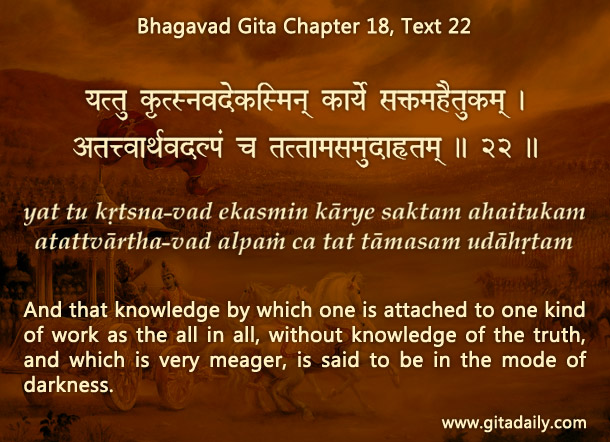The Bhagavad-gita (18.22) describes knowledge in the mode of ignorance, which leads people to obsess over one thing as if it were everything. Such an obsession can be a huge obstacle in meditation. Meditation vs. Obsession
Whenever we are trying to meditate, we are trying to connect with a bigger reality: first, by getting a big picture of reality, and then by diving deeper into our place and purpose within that big picture. But if we are glued, maybe even padlocked, to a tiny fragment of reality because of our obsession with it, meditation becomes nearly impossible.
Some people may consider even meditation to be an obsession: “Isn’t a meditator fixating on some remote, invisible reality and neglecting the immediate, visible reality that matters in tangible ways?” While it is possible that some people may use meditation as a form of escapism to avoid dealing with life’s complexities and perplexities, this is neither the purpose of meditation nor a recommended motivation for any meditation that is meant to be sustainable and transformational.
Meditation is meant not to run away from visible reality but to remind ourselves that there is an invisible reality that endures far longer than the visible reality with its ever-changing parade of burning issues that burn out in no time. Through meditation, we can get an anchor in that unchanging, invisible reality, by which we can better face the stormy waves and winds that characterize the visible reality, filled as it is with dualities.
While meditation can be of many types, devotional meditation takes us to a stronger anchor. It reveals that the invisible reality centers on and culminates in the all-attractive personal divinity, Krishna. It reveals further that Krishna is ultimately controlling and orchestrating the visible reality for the ultimate purpose of raising human consciousness and drawing all of us toward him in an eternal bond of love.
This devotional vision of Krishna’s purposefulness infuses within us also a devotional purposefulness when we engage with visible reality. We seek neither to run away from it nor chase after it; instead, we choose to respond to it and navigate through it in a way that helps us raise our consciousness and helps us help others raise their consciousness. Indeed, it harmonizes us with Krishna’s plan for us and for the world at large.
Whereas obsession leads to a fragmented vision and disintegrated approach to life, devotional meditation leads to a holistic vision and an integrated approach to life.
Summary:
- When we are subjected to obsession, wherein we fixate on one fragment of reality as if it is everything, we just can’t focus during our meditation.
- While some people treat meditation as escapism from visible reality, actual meditation equips us to neither run away from it nor chase after it, but to anchor ourselves in an invisible reality, thereby better facing the dualities of visible reality.
- Devotional meditation doesn’t just provide us a divine anchor beyond visible reality, but also infuses us with a higher purpose for engaging with visible reality.
Think it over:
- Why is obsession an obstacle in meditation?
- What is wrong with those who let meditation become their obsession?
- How does devotional meditation bring a higher purpose to our daily activities?
***
18.22 And that knowledge by which one is attached to one kind of work as the all in all, without knowledge of the truth, and which is very meager, is said to be in the mode of darkness.



Leave A Comment